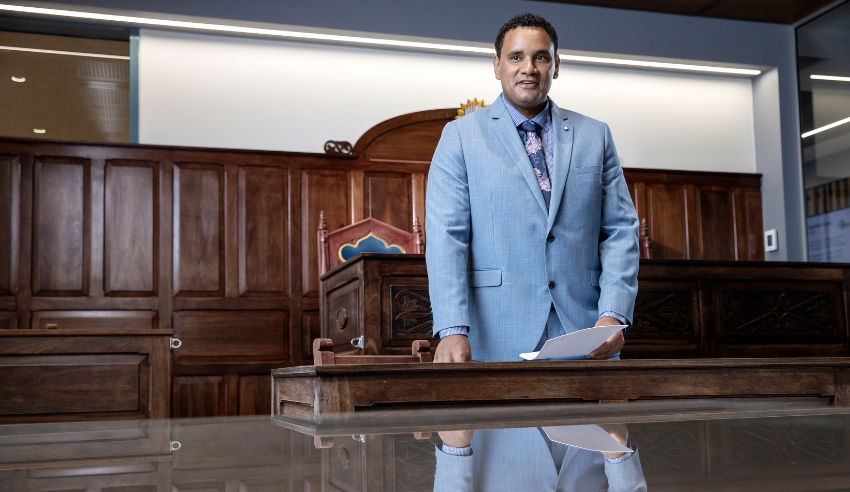Queensland Law Society executive, advocate and budding lawyer Joshua Apanui’s first brush with the law and the legal profession was as a client facing the courts over minor offences. Although an unusual start, this experience gave Mr Apanui a glimpse into the system that few lawyers can claim and even fewer can take advantage of.

In a new episode of The Protégé Podcast, Mr Apanui shared how this experience as a client shaped his understanding of the law from the other side of the bench. The biggest thing to come out of it, he said, is the interpretation of the law – particularly as it frames Indigenous people and relegates lawyers with a different background.
Mr Apanui shared that his unfortunate background with the law has opened him up to unfair criticisms from others, particularly from those in the legal profession who tend to tell him that “it’s criminogenic” and place him into this small theoretical box.
“So if you go to youth detention, if you go to incarceration or anything like that, you’re more likely to keep committing crime. What I mean by that is the whole population relegates, especially First Nations people, to one corner, like that’s all you’re going to be, that’s what you’re going to be, and that’s your outcome on life,” he said.
Coming into the legal profession, Mr Apanui said it has helped to broaden his scope in what he can do to make a change and impact his clients’ lives. Even if he cannot be a mouthpiece for those clients, he can be for his people. This, he added, is part of the work and the advocacy that he’s doing with the Queensland Law Society.
Mr Apanui explained that he’s been working extensively with policy solicitors and the policy team within the Law Society to make changes that affect First Nations people. He said they go “above and beyond” to create opportunities and make sure that the law and the legal profession is open and willing to accept Indigenous lawyers.
At the moment, he said recent data indicated that there are just 88 current Aboriginal and Torres Strait islander solicitors in Queensland. Mr Apanui said they are tracking well in welcoming more and more Indigenous lawyers to the profession – including at education levels. One example of this is an initiative in local high schools.
The initiative, Law Link, connects high school students with lawyers and law firms to discuss the profession and answer any of their questions. Mr Apanui said that they really engaged with what they had to say and were enthusiastic about the potential.
“They were asking questions, [including] about sports law and the area, and so we broke that down. We went there with lawyers and law firms, which felt really good. It’s great to see the Queensland Law society taking that initiative, and hopefully, that program gets extended further,” Mr Apanui shared of the high school experience.
Mr Apanui himself was able to get involved in the profession through an education program, specifically Bond University’s graduate diploma in legal practice Indigenous scholarship, which covered all tuition costs for the online course. Explaining this experience, Mr Apanui said entering the profession “really helped me” to broaden “my scope, my lens, my mind, in what I can do” for his clients and community.
In the episode, he shared some advice for firms and lawyers on what they can also do to assist Indigenous lawyers, starting with understanding their background: “That’s probably one of the most important things for me, [because] reconciliation is about relationships, and so is the Aboriginal community and the culture.
“In the legal profession, time is of the essence. Sometimes, it’s a little bit hard, and I understand that only because of how I’ve found myself in the profession. Time is precious to First Nations people. My advice is to give us opportunities but don’t just give us the opportunities – get to understand us, get to understand our values.”
For new lawyers, Mr Apanui advised finding a passion and pursuing it into the profession. If they don’t have one, however, he said to “just apply”. His work with the Queensland Law Society started with knowing little about the society and what it does to being there for two years, where he has made real, major change.
“Work out what your passion is. I know that everyone says that, but whatever your passion is, whether it’s Indigenous rights, whether its land rights or what’s happening with the Voice to Parliament or gender equality – if that’s your passion, that’s your battle,” Mr Apanui said. “My thing is that if your passion is your own battle, then we’re all in different battles but in the same war, and so we have to unite.”
Listen to the entire episode here!
If you have any questions about the episode or if there are any topics that you might want us to look into, please reach out – we would love to hear from you!
We’re also always open to new guests, so if you have an exciting story to tell, if you’re standing out as a student or graduate, or if you can offer some tips for our young lawyers, get in touch.
